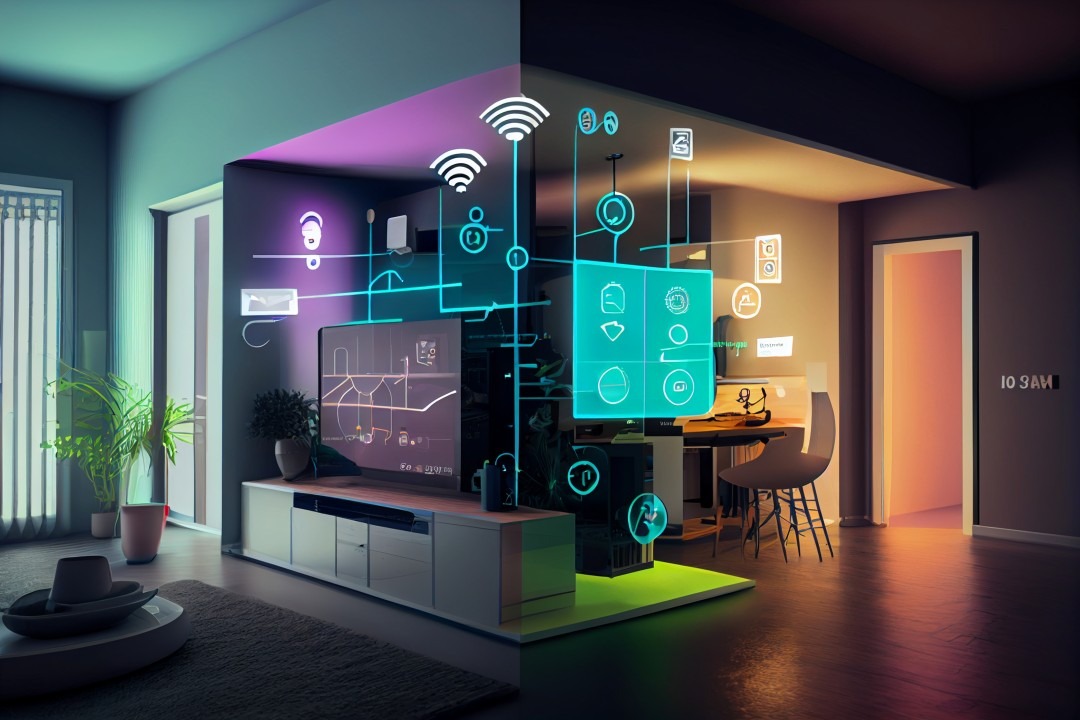The Internet of Things (IoT) has emerged as a transformative technology with applications spanning various sectors, including smart homes and industry. By connecting everyday objects to the internet and enabling them to communicate and share data, IoT facilitates automation, efficiency, and convenience. In this article, we delve into the applications of IoT in smart homes and industry, exploring how this technology is revolutionizing our living spaces and transforming industrial operations.
IoT in Smart Homes: Enhancing Comfort and Efficiency
In smart homes, IoT devices play a central role in automating and optimizing various functions to enhance comfort, convenience, and energy efficiency. IoT-enabled thermostats, for example, can intelligently regulate temperature settings based on occupancy patterns and external weather conditions, resulting in energy savings and enhanced comfort for residents. Similarly, smart lighting systems adjust brightness levels and colors according to user preferences and natural lighting conditions, contributing to energy efficiency and ambiance control.
Moreover, IoT devices such as smart appliances, security cameras, and voice-activated assistants enable remote monitoring and control of home systems, providing homeowners with greater convenience and peace of mind. From remotely managing household chores to receiving real-time alerts about potential security threats, IoT empowers residents to maintain and monitor their homes from anywhere, at any time.
IoT in Industry: Optimizing Operations and Enhancing Productivity
In the industrial sector, IoT technology is driving digital transformation and revolutionizing traditional manufacturing processes through automation, predictive maintenance, and data-driven insights. IoT sensors embedded in machinery and equipment collect real-time data on performance metrics such as temperature, pressure, and vibration, enabling predictive maintenance and reducing downtime. By detecting potential equipment failures before they occur, IoT helps prevent costly disruptions to production and extends the lifespan of critical assets.
Furthermore, IoT facilitates the implementation of smart manufacturing practices, such as asset tracking, inventory management, and supply chain optimization. By integrating IoT data with analytics platforms and machine learning algorithms, manufacturers can gain actionable insights into production processes, identify areas for optimization, and improve overall operational efficiency. From optimizing production schedules to reducing waste and enhancing product quality, IoT empowers manufacturers to stay competitive in a rapidly evolving market landscape.
IoT Security and Privacy Considerations
While the adoption of IoT offers numerous benefits in smart homes and industry, it also raises concerns about security and privacy. The proliferation of connected devices increases the attack surface and potential vulnerabilities that malicious actors can exploit. Weaknesses in IoT device security, such as default passwords, lack of encryption, and outdated firmware, can compromise user data and expose home networks to cyber threats.
In industrial settings, IoT security breaches can have far-reaching consequences, including production disruptions, intellectual property theft, and safety hazards. Therefore, it is essential to implement robust security measures, such as encryption, authentication, and access control, to safeguard IoT devices and data from unauthorized access and cyber attacks. Additionally, regular software updates and patch management are crucial to addressing known vulnerabilities and maintaining the integrity of IoT systems.
Future Trends and Innovations
Looking ahead, the adoption of IoT in smart homes and industry is expected to continue growing, driven by advancements in connectivity, sensor technology, and data analytics. In smart homes, the integration of IoT with artificial intelligence (AI) and machine learning algorithms will enable more personalized and predictive automation, anticipating user preferences and optimizing energy usage.
In the industrial sector, the convergence of IoT with other emerging technologies, such as 5G networks, edge computing, and digital twins, will unlock new possibilities for real-time monitoring, analysis, and decision-making. From smart factories to connected supply chains, IoT will play a pivotal role in enabling Industry 4.0 initiatives and driving innovation across the manufacturing ecosystem.
In conclusion, IoT applications in smart homes and industry are reshaping the way we live, work, and interact with the world around us. By harnessing the power of connected devices and data-driven insights, IoT promises to create more sustainable, efficient, and secure environments for individuals and businesses alike. However, addressing security and privacy challenges will be essential to realizing the full potential of IoT and ensuring a safe and reliable connected future.

